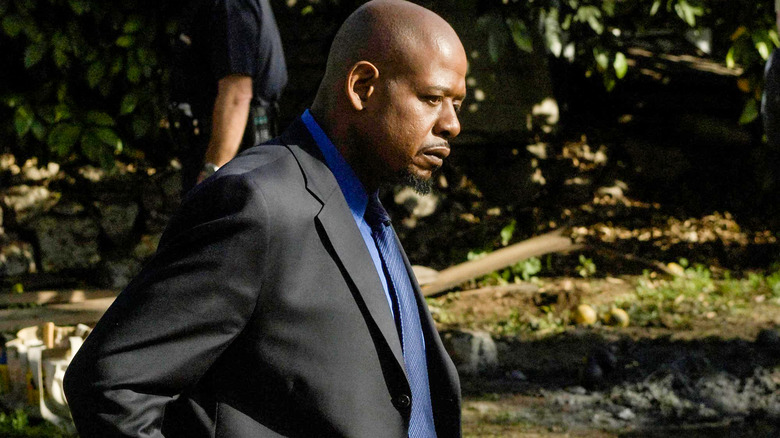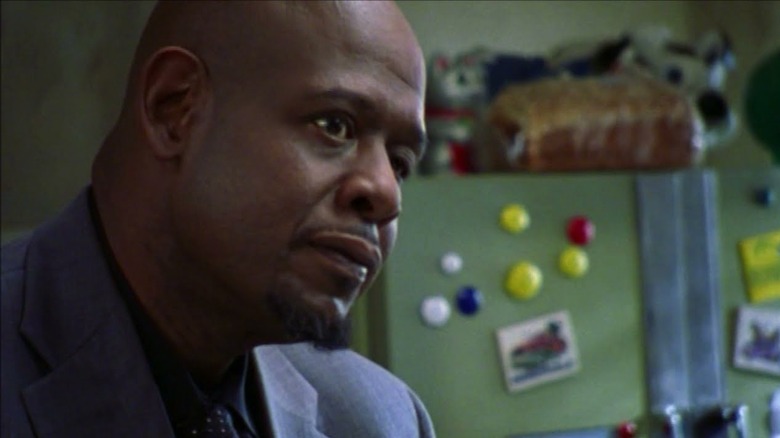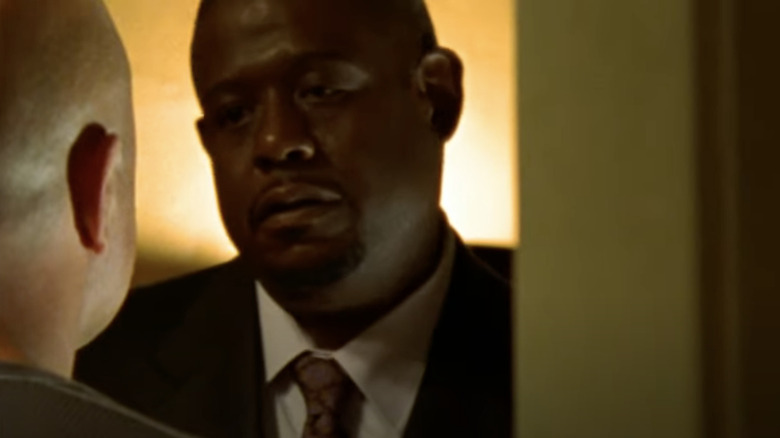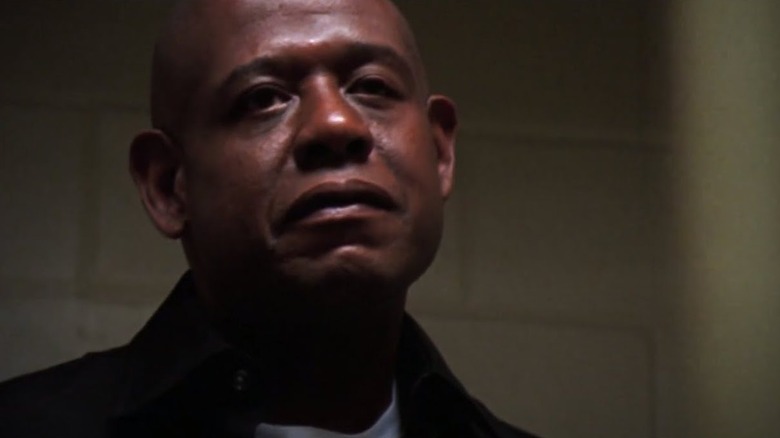Forest Whitaker Was Dumbfounded By The Reaction To His Character On The Shield
Michael Chiklis knew "The Shield" would attract audiences before it even premiered. He showed a rough cut of the pilot to his neighbors and when they reached the now infamous ending — Chiklis' character, the corrupt detective Vic Mackey, kills one of his own men, Terry Crowley (Reed Diamond), who'd been spying on the rest of the team — Chiklis recalled:
"One of my friends turned and said, 'Oh my God, you're a villain.' And my other friend went, 'Wait a minute, whoa! He's not a villain, that guy's [Crowley] a rat.' And they started vehemently fighting and I just sat there going [...] 'Wow, we're onto something here.'"
According to Chiklis, this divide spoke to the question of the show: how much evil will we accept from law enforcement in the name of public safety? It was an especially pertinent question in the wake of 9/11 ("The Shield" premiered on March 12, 2002) and his friends' split reactions proved the show was doing its job of pushing the question and letting the audience decide for themselves.
After Crowley is gone, it gets easier to root for Mackey and his strike team because the antagonists they face are all worse. There's Armadillo Quintero (Danny Pino), a cartel enforcer who rapes women then brands them with dove tattoos, psychotic drug lord Antwon Mitchell (Anthony Anderson), and a handful of serial killers.
Then, in season 5, the strike team again weren't the lesser of two evils. That season introduced Lieutenant Jon Kavanaugh (Forest Whitaker), an Internal Affairs officer out to prove Vic's crimes. Series creator Shawn Ryan, his writers, and Whitaker himself approached Kavanaugh as the good guy, at least compared to his prey. But to Whitaker's shock, the audience didn't see it that way.
Whitaker as Kavanaugh
Forest Whitaker is a brilliant performer, but also an eccentric one. His characters always have two tics at least and with his paced, breathy delivery of lines, they always seem on edge too. Kavanaugh is right in that mold. It's telling how Whitaker parodied his "The Shield" performance on "American Dad" and that character, Detective Turlington, doesn't feel an inch out of place.
Whitaker's approach often works: see his Oscar-winning performance in "The Last King of Scotland" as Idi Amin, the psychopathic former dictator of Uganda. Sometimes it doesn't; he feels out of tune as the half-mad freedom fighter Saw Gerrera in "Rogue One: A Star Wars Story."
Thankfully, Kavanaugh is a performance that works; though heightened, Whitaker's acting never feels inauthentic and he's a scene-stealer. An Entertainment Weekly interview with Whitaker touted him as an Emmy contender for "The Shield" — in a galling snub, he wasn't even nominated. In fact, Whitaker's performance is my favorite performance on "The Shield," even if I do find it a bit unfair to say this about what's essentially an extended guest spot (he's in 13 episodes, a season's worth out of the total 78).
That said, Kavanaugh is a character that could have only come in later. By season 5, "The Shield" has a status quo and we've seen Vic and co. defeat other foes. Kavanaugh is designed as a new challenge for them; one with the law on his side and principles, but with a ruthless edge too. Whitaker's performance excelled in part because he was in such a dynamic role; Kavanaugh versus Vic remains one of the best battles of wits I've seen on TV. And yet, a lot of viewers hated Kavanaugh because he was at Vic's throat.
'I'm the good guy here'
According to Chiklis, Whitaker was 'confounded' by the hatred for Kavanaugh for one reason: "I'm the good guy here." Whitaker and Ryan addressed this as well in a joint interview with IGN. Ryan said that Kavanaugh was written as a good guy who genuinely saw Vic as someone who needed to go down (for obvious reasons), adding:
"We did a conference call last year when some reporter sort of coined the phrase that if Vic Mackey was an anti-hero that Forest was playing an anti-villain [...] he was someone that you found yourself rooting against, but for no real good logical reason."
Both Ryan and Whitaker felt it came down to audiences liking Vic — and Chiklis' performance — too much to root against him. Whitaker described many reactions to Kavanaugh he got personally as such: "I would get a lot of, 'Man, I like your character, but will you leave my guy alone? Will you leave him alone?' I'm like, okay. I don't think that's my purpose on the show, but let's see."
During a panel held by the Television Academy with Chiklis, Whitaker, and Ryan all in attendance, they agreed Kavanaugh was a good guy ... at least at first. Whitaker discussed the situation with good humor, but you can tell the confusion was still there; he objected to a question which described Kavanaugh as "a bad guy" and took turns with the other panelists recounting Vic's crimes. Chiklis added, "I've had people come up to me and literally go, 'How are you going to kill [Kavanaugh]?" Whitaker interjected, "And this is cops too!"
Spoiling the fun
Shawn Ryan said the reaction taught him "a real big lesson about television," as he had "expected people to be torn by, 'Should I root for [Kavanaugh] against Vic or not?', and they weren't torn, they were rooting for Vic." The lesson he learned was that "if you present a point of view for a person and you make that person human enough, no matter how much bad stuff they do, people will appreciate and grasp onto that humanity and root for them." It's easy to see this as a precursor to "Breaking Bad," where on a cast filled with professional criminals, Skyler White (Anna Gunn) wound up being the most hated character simply for being a nag and objecting to her husband cooking meth.
Matt Zoller Seitz and Alan Sepinwall, authors of "The Sopranos Sessions," have a theory about that series that I think ties into this. Seitz and Sepinwall believe that one reason Carmela Soprano (Edie Falco) never earned the audience ire that Skyler would is because she's ultimately complicit in her husband's crimes. They write, "If you tune into 'The Sopranos' partly to enjoy watching Tony and his crew run scams, you never have to worry about Carmela being the killjoy getting in the way of their fun, and yours."
I think that this also helps explain why many "The Shield" fans hated Kavanaugh: because he was "a killjoy." A lot of people watched the show because they liked seeing Vic break the rules for a supposed "greater good" — even I'll admit that I didn't complain in "Doghouse" when Vic lets loose a K-9 officer on a fleeing rapist. If you think Vic was right to kill Terry Crowley, there's no way you would like Kavanaugh. And many people didn't.



